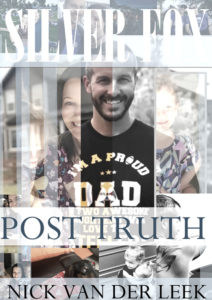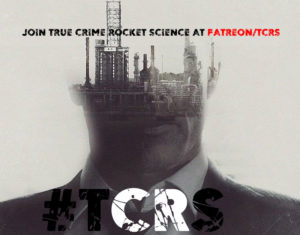True Crime Analysis, Breakthroughs, Insights & Discussions Hosted by Bestselling Author Nick van der Leek
Tag: body language analysis
Many of us, perhaps most, intuitively knew something was rotten in the state of Denmark when we first saw Watts’ seven-minute Sermon on the Porch. We didn’t know why, it wasn’t necessarily anything specific, yet there was a suspicion [if not certainty] that things just weren’t adding up.
By studying and analyzing the Sermon again and again, we became more familiar with Watts, with the content and context, and as we became experts in this piece of dialogue it was more and more difficult for microexpressions to remain hidden. The more we looked and listened, the more sure we were that he was hiding something. It turned out he was trying to conceal a triple murder.

His main ploy was to act normal, but what counted against him was:
- He acted too normal
- His version of normal didn’t meet our expectations of “appropriate” emotion. He didn’t appear concerned or overwhelmed as most people would have been had they been in a genuine missing person’s scenario
We can see that by his acting normal, he was trying to communicate that there was nothing to worry about, and that everything was probably okay. But this was an early miscalculation from him, and an early sign Watts’ ability to recognize when his chips were down was very poor.
Once the bodycam footage emerged, we quickly recognized telltale patterns in his deceits – lip licking, swaying, folding his arms.

Some of us also picked up a few others – stuttering, Watts curling his lower lip under his upper lip [a sign of stress or nervousness], looking at the sky for inspiration, throwing out his hands, shaking his head at the wrong time, appearing to smile at the wrong time, and blinking at the wrong moment. But many of these were assumptions, and subjective assumptions at that.

Now, with the benefit of the Discovery Documents, we’re able to test them.
A VISUAL POLYGRAPH
We can use what’s in the Discovery Documents to cross-reference what we know as absolute certainties of fact against the bullshit parts of his Sermon. So let’s do a bullshit check with only one piece of information, and watch for the microexpressions that leaks out.
We’ll apply our visual polygraph test to the moment when Watts explains Bella’s kindergarten attendance. The fact is the four-year-old was supposed to return to Primrose school that morning [August 13] if she hadn’t died.
Now, there are numerous texts in support of this fact [scroll to the bottom of this post to review them]. Prior to the weekend, on August 9, Shan’ann pertinently asked her husband to drive with her and Bella to be with them to share Bella’s first day of the new school year at Primrose.

At 2:42 in the clip below, during his Sermon on the Porch, Watts lies not by his denial that Bella was going to school, but the opposite. He volunteers that Bella was going to go to school, but then realizes this disclosure could be bad for him, so he tailors the end of that message by changing the timing of her return [and that’s the lie].
WATTS: Bella [long blink] was gonna start kindergarten…[pauses as he realizes he’s just said this in the past tense]…[stutters] n-next Monday…and they-they’re just getting ready to start.
So his basic tells are:
- Extended blinking while talking.

2. Looking into the sky for inspiration + stuttering
3. A lip curl at the end of the lie, as if signing it off and getting on to the next one
In terms of the semantics, can you see how this statement makes no sense?
Bella was gonna start kindergarten…n-next Monday…and they-they’re just getting ready to start…
But why would they be getting ready on Tuesday if they were going to school next Monday? If Bella and Ceecee were [are, actually] going to start kindergarten the following week, then as he was standing there, that was still true [within his spiel]. And that would mean present tense:
Bella’s starting kindergarten soon…[Bella is…]
So Bella was going to start kindergarten was a big booboo, and the stuttering, blinking, looking at the sky, and pausing, were all telltale clues that he was dissembling and trying to clean up his verbal diarrhea.
We now know Watts knew they were dead, and so he knew he’d already pulled them out of kindergarten, and he was probably nervous as hell the staff at Primrose were watching this. What about other parents, like Jeremy Lindstrom, and Shan’ann’s mother, who knew their kids had gone back to school that day [and Sandi knew the same].
It’s clear from this one lie that the kids going back to that expensive school weighed heavily on him, otherwise there would be no need for nervousness around this subject, and no need to lie about it.
So just as it’s valid to ask “Why didn’t he just get divorced”, in terms of the murders of those poor little girls, it’s just as valid to ask, “Why didn’t he just take them out of kindergarten?”
Perhaps the answer to the one question relates and interrelates to the answer of the other.








At 4:44 in the interview clip Chris Watts lets slip an extraordinary clue. We missed it because the journalist used that moment to rejig his camera, and so as the question is being lined up, the image is temporarily off-camera.
This resetting throws Watts off camera and throws off our concentration as well. But when we anchor the scene to a narrative, when we nail it down to a transcript, the slippery slip is captured in our true crime net. So let’s do that now.
To pick up what he’s saying and how the slip happens, we need to back up about 50 seconds. Here’s the context: Chris Watts has just made a long speech about wanting everyone to “just come home.”
This is it:
REPORTER: Can I ask another tough question, your relation with the kids?
WATTS: Whe… whenever, I mean, the kids are my life, I mean, those… those smiles are my life and there’s, like, I mean, last night, like, during…you know, when they usually dinner it was just, like, I missed them like, I mean, I missed tell them: Hey, you got to eat that or you’re gonna… not gonna get your dessert! You know, and just, like: Not gonna get your snack after! I missed that, I missed them, you know, cuddle up on their couches. They have like a Minnie Mouse couch and Sophia couch that they cuddle up on and watch on Bubble Guppies or something and it was just, like, you know, I mean, I… I was com… it was tearing me apart last night and I needed that, I needed that last night and for that… for nobody to be here last night and then going into their rooms and not… and know that I wasn’t gonna turn the rain machines on, I know that I wasn’t gonna turn their monitor on, no, I wasn’t gonna kiss them to bed tonight, it was… it… it was like I… I co… that’s why last night was just horrible, I couldn’t do it th… I was… I just want… I want everybody to come home like wherever they are at. Come home, that’s what I want.
He uses the past tense here, and refers to “tearing apart”. This clearly shows in his mind he knows they’re already dead.
But this is just the lead up to the slip. After this answer there’s a protracted silence where Watts curls his lower lip and presses it under his upper lip, and holds it there for a few seconds. The cameraman uses this break to set himself up at a better angle.
During this pause the dogs can be heard barking loudly, and Chris Watts appears to blink rapidly – anxiously. The subject matter they’re dealing with now is making him nervous, and it should.
It’s probably because of this anxiety, and the direct question about his children stirring up the still raw memory of their corpses, and the recent handling of their bodies, and having to account for it this soon, that causes his heart and mind to race. That’s why the slip happens when it does.
The reporter stumbles through his next question. He’s not sure, it seems, what he wants to ask. He says something like “where has she gone for” while the neighborhood dogs are still going nuts.
REPORTER: She was…she was…she came back Sunday just under two at night?
WATTS: Yeah, cause her flight got delayed from Arizona, cause, like, other storms around the…the nation, so she was supposed to get home like eleven, she got home at like 01:48 [swaying as his standing, flips out his left hand], got to bed [blinks] about 02:00.
Chris Watts glances towards the window as he says “got home at like 01:48”. Sometimes when we remember things, we do so in sympathy. We act out what happens. We look in the direction of where something happened as we re-navigate the memory of it.
The slow blink when he says the word bed is significant. I don’t think something happened in the bed as much as Shan’ann never made it to bed, and probably didn’t even make it upstairs.
REPORTER: What was she gone for? Like a family trip-?
WATTS [Swaying from one leg to the other]: It was a Thrive…direct sales, uh… it was a local event that was down there between a bunch of leaders [flaps out his hand] in-in the company.
Then, arms folded, he purses his lips again.
REPORTER: And then, the day she was back, I mean…?
And so this is where the slip happens. He’s still pursing his lips together, blinking rapidly, and the dogs are making a racket in the background when he starts answering. He starts answering with a stutter.
WATTS [Shaking his head, a slight flash of teeth as he smiles, still swaying from side to side the whole time]: I lef-I left wor-for work [glances left] early that morning like 05:15, 05:30 so like [holds out his hand]…she [shrugs]… barely let me in [glances up], she barely got… barely gotten [blinks] into bed pretty much.


His mouth is open at the end of that, in the holding pattern of a slight smile.
She barely gotten into bed pretty much
Consider that he buried her in a sheet from the bed, and so one nasty interpretation of the question and his answer: maybe he thinks it’s funny what he did to her and with her vis-a-vis the soft minimizing words he’s giving about her to the media:
She barely gotten into bed pretty much
A lot happens in the entirely of his answer too. So few words, so much going on, so many lives undone between those letters, those lines. He stutters, he interrupts himself, he repeats himself and he barely answers the question about what she – Shan’ann – was doing.
He talks about himself leaving, and where he was. The only word – and it’s only one word – that he offers to answer the implied question the reporter doesn’t quite ask [Where?] is bed. But he’d rather not say it. That’s why it’s bed…pretty much.
He doesn’t want to talk about where. Where is the big kahuna in this conversation, the one thing he really doesn’t want anyone to know.

If he’d answered as simply and as straightforward as he could, he could have said:
She came home late and went to bed.
But instead he seems be unsure whether or not she went to sleep. If we remove the last part, the bit he’s uncertain about, it becomes:
She came home late and…
She went to her grave. She went to bed. It’s symbolically similar pretty much, unless you’re Shan’ann.
He repeats the word barely three times. Think about the word barely and the context we’re talking about: Murder at the last minute. A flight delay of three hours. An early morning trip to a remote site before dawn.
Barely…
And all he has to say is she came home and went to bed. So what’s this barely business?
She barely let me in, she barely got, barely got in bed. Pretty much.
Pretty much got in bed? Or pretty much didn’t get into bed?
But none of this is the slip. The critical slip is where he says I left work [interrupts himself] and then says she barely let me in…barely got…before he interrupts himself again.
We know when he says he left-he left work-he left for work that actually he wasn’t working that morning, he was dumping bodies at his work. So we see what happens when he lies – he stutters.
What he seems to be struggling to avoid saying is:
she barely let me in
The slip up sounds like he’s remembering himself barely letting her inside before killing her. Or:
she barely let me
She barely let him…kill her?
Barely because he was pressed for time…
Barely because the three hours delay was driving him nuts and potentially scuttling his big plans…
Barely because when he struggled, she fought back…
And the repeated stuttering on the I left-I-left-I left is because the going to work was a crucial part of covering up the whole thing. At the time of the interview, the cover was still holding, the bodies were still missing, the status of the victims was still unknown. Barely.
When he left, it was all about being seen to leave for work like it was any other day. That was the point of it. But:
she barely let me
Since he was caught and arrested in record time it seems there was no barely about it; Shan’ann didn’t let him get away with anything after all.

© 2026 TRUE CRIME ROCKET SCIENCE
Theme by Anders Noren — Up ↑











Recent Comments